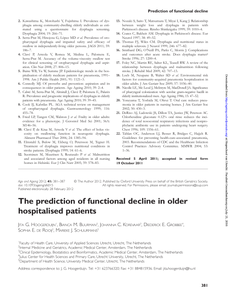Background: Due to the increasing number of older people with multi-morbidity, the demand for outpatient geriatric rehabilitation (OGR) will also increase. Objective: To assess the effects of OGR on the primary outcome functional performance (FP) and secondary outcomes: length of in-patient stay, re-admission rate, patients’ and caregivers’ quality of life, mortality and cost-effectiveness. We also aim to describe the organisation and content of OGR. Methods: Systematic review and meta-analysis. Five databases were queried from inception to July 2022. We selected randomised controlled trials written in English, focusing on multidisciplinary interventions related to OGR, included participants aged ≥65 and reported one of the main outcomes. A meta-analysis was performed on FP, patients’ quality of life, length of stay and re-admissions. The structural, procedural and environmental aspects of OGR were systematically mapped. Results: We selected 24 studies involving 3,405 participants. The meta-analysis showed no significant effect on the primary outcome FP (activity). It demonstrated a significant effect of OGR on shortening length of in-patient stay (P = 0.03, MD = −2.41 days, 95%CI: [−4.61—0.22]). Frequently used elements of OGR are: inpatient start of OGR with an interdisciplinary rehabilitation team, close cooperation with primary care, an OGR coordinator, individual goal setting and education for both patient and caregiver. Conclusion: This review showed that OGR is as effective as usual care on FP activity. It shows low certainty of evidence for OGR being effective in reducing the length of inpatient stay. Further research is needed on the various frequently used elements of OGR
DOCUMENT

BACKGROUND: Due to the increasing number of older people with multi-morbidity, the demand for outpatient geriatric rehabilitation (OGR) will also increase.OBJECTIVE: To assess the effects of OGR on the primary outcome functional performance (FP) and secondary outcomes: length of in-patient stay, re-admission rate, patients' and caregivers' quality of life, mortality and cost-effectiveness. We also aim to describe the organisation and content of OGR.METHODS: Systematic review and meta-analysis. Five databases were queried from inception to July 2022. We selected randomised controlled trials written in English, focusing on multidisciplinary interventions related to OGR, included participants aged ≥65 and reported one of the main outcomes. A meta-analysis was performed on FP, patients' quality of life, length of stay and re-admissions. The structural, procedural and environmental aspects of OGR were systematically mapped.RESULTS: We selected 24 studies involving 3,405 participants. The meta-analysis showed no significant effect on the primary outcome FP (activity). It demonstrated a significant effect of OGR on shortening length of in-patient stay (P = 0.03, MD = -2.41 days, 95%CI: [-4.61-0.22]). Frequently used elements of OGR are: inpatient start of OGR with an interdisciplinary rehabilitation team, close cooperation with primary care, an OGR coordinator, individual goal setting and education for both patient and caregiver.CONCLUSION: This review showed that OGR is as effective as usual care on FP activity. It shows low certainty of evidence for OGR being effective in reducing the length of inpatient stay. Further research is needed on the various frequently used elements of OGR.
MULTIFILE

Thirty to sixty per cent of older patients experience functional decline after hospitalisation, associated with an increase in dependence, readmission, nursing home placement and mortality. First step in prevention is the identification of patients at risk. The objective of this study is to develop and validate a prediction model to assess the risk of functional decline in older hospitalised patients.
DOCUMENT
